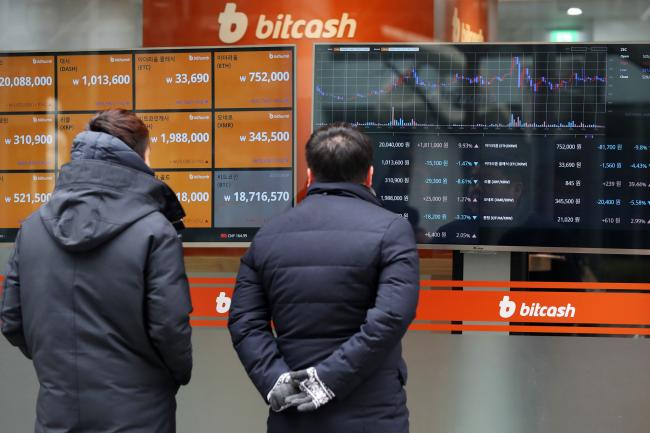(Bloomberg) -- It’s the kind of market anomaly that savvy traders usually devour in fractions of a second: bitcoin prices in South Korea are 43 percent higher than those in the U.S.
Arbitrage 101 says buy in America, sell in Korea, and pocket the difference for a risk-free profit, minus transaction costs.
If only it were that easy.
Market participants who’ve studied the price gap, known locally as the “kimchi premium,” say Korea’s foreign-exchange and anti-money-laundering rules are making it difficult for traders to gobble up the proverbial free lunch.
The lack of selling pressure from arbitragers has left bitcoin prices in Korea tethered to the whims of the nation’s individual investors. The resulting boom has alarmed local authorities and underscored how fractured markets and feverish speculation can lead to strange outcomes in the nascent world of cryptocurrencies.
It also helps explain why Coinmarketcap.com, a widely followed provider of data on digital currencies, excluded Korean exchanges from some of its pricing calculations this week.
The move, which created the appearance of a market selloff for the website’s users, helped spark a real-life exodus from several digital currencies on Monday. Bitcoin sank more than 10 percent, according to composite pricing on Bloomberg.
Despite the turbulence, bitcoin’s Korea premium shows few signs of disappearing. Below are some of the biggest reasons why the gap has persisted, along with a few ideas on how arbitragers can still make money.
Strong Local Demand
Koreans have an outsized infatuation with bitcoin. The country punches above its weight when it comes to cryptocurrency volumes, with local venue Bithumb ranked No. 2 worldwide by Coinmarketcap.com. So many Koreans have piled in that the prime minister recently warned that bitcoin might corrupt the country’s youth.
Read more about Korea’s crypto-mania here.
There’s no definitive explanation for why the fervor is so extreme, but some observers point to the long-held fondness for supercharged financial bets in a country that once boasted the world’s most active stock-index derivatives market.
It helps that local cryptocurrency exchanges don’t allow short sales, making it difficult for bears to bet against the market. (The government also proposed banning non-residents from Korean cryptocurrency exchanges in December.)
While policy makers have vowed to crack down on excessive speculation, that may just be adding fuel to the frenzy in the short term, said Mike Kayamori, head of Tokyo-based exchange Quoine, which counts Koreans among its customers.
“Before regulation kicks in, people want to buy,” he said.
Korea’s Forex Rules
To arbitrage the price gaps between bitcoin venues in Korea and elsewhere, local traders must first exchange their won into a foreign currency, such as the dollar or euro, that’s accepted by overseas cryptocurrency venues.
Korea’s foreign-exchange regulations put a wrench in the process. Local residents and companies moving more than $50,000 out of the country in a single year must submit documents to authorities proving their reasons for the transfers, which may not always be approved. Annual transactions totaling more than $10,000 must be reported to tax authorities.
“The won is a restricted currency, so cannot be easily exchanged,” said Cedric Jeanson, chief executive officer of BitSpread Group, which has offices in New York, London and Singapore.
Some traders are concerned that foreign exchange purchases related to cryptocurrency arbitrage could trigger anti-money-laundering inquiries.
“If you attempt to move out of positions in Korea, they have tougher money-laundering tools,” said Tony Pietrocola, head of business development at financial technology company PromonTech. “To fill out the paperwork and do those transactions, you could easily get flagged.”
Representatives from Korea’s finance ministry and central bank declined to comment.
It’s worth noting that Korea isn’t the only country where bitcoin trades at a premium, even if it is the standout among major markets. Other nations with a history of capital controls, including Zimbabwe and Argentina, also have big price gaps versus the U.S.
Volatility Risk
Another hurdle in Korea -- and elsewhere -- is that transferring bitcoin between exchanges isn’t always instantaneous. That can leave arbitragers exposed to adverse price swings.
“Making a quick transaction with low risk is just not there for this space,” said Ian Rosen, CEO of financial communications platform Stocktwits. “There’s difficulty moving money in and out of exchanges.”
Professional arbitragers with experience in managing such volatility may be reluctant to operate on bitcoin exchanges because many of the venues are unregulated and vulnerable to hacking.
Potential Workarounds?
Moonsung Bae, a 36-year-old financial analyst in Seoul who trades cryptocurrencies for his personal account, said he has profited from the kimchi premium without transferring funds into foreign currencies. Instead, he uses alternative cryptocurrencies like ether.
One of his strategies involves buying ether in Korea, transferring it to an offshore venue, exchanging it for bitcoin, transferring the bitcoin back to Korea, and cashing out. That works as long as Korea’s ether premium is smaller than the bitcoin premium, he said.
Another option is arbitraging price differences between Korean exchanges, Bae said. Bitcoin recently traded at the equivalent of $21,751 on Bithumb, versus $22,674 on another Korean venue called Upbit. That compares with $15,255 on Coinbase, one of the biggest U.S. exchanges.
For a menu of cryptocurrencies on the Bloomberg: VCCY
For bitcoin prices: XBT Curncy
